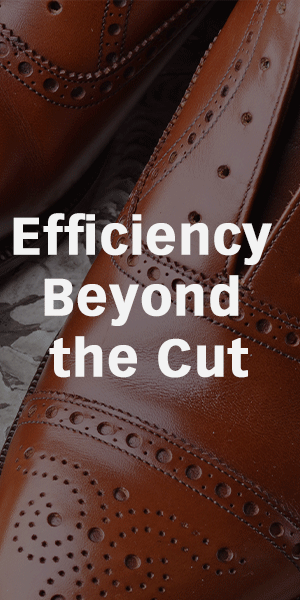Happy feet

When it comes to making shoes for the feet of a child, compromising on quality is out of the question for Spanish brand Dechics.
The province of Alicante in the east of Spain is the country’s footwear heartland. Those within the industry will be familiar with Elda, Elche and Petrer, three towns which are home to the manufacturing operations of a plethora of well-known shoe brands. Less familiar to most will be the small town of Monóvar (sometimes referred to as Monòver), just seven kilometres from Elda and a quarter of its size in terms of inhabitants.
It is here that children’s footwear brand Dechics is based. The name is a concatenation of the phrase ‘for children’ in the Valencian language, an official language of the autonomous community of which Alicante is a part. The company makes children’s shoes under its own brand name, including made-to-order footwear for special occasions like communions or baptisms, and is a manufacturing partner for a number of other footwear groups.
All aspects of the business are run from Monóvar, from initial design through to creation of the final product. It is also the base for its marketing and distribution operations. Its factory produces roughly 2,500 pairs of shoes each day although, as mentioned, some of these are for other companies. There is some automation, but responsibility is principally with the around 70 employees working there.
Dechics likes to say that while the machinery helps with the production process, its shoes are still very much made by hand. It believes no machine can truly replicate the input of a qualified shoemaker. Leather is one of its preferred materials; the company tells World Footwear that it mainly uses goat and bovine leather from origins like Spain, Italy, Russia and Brazil.
It opened an own-brand store in its hometown in 2005 and now also sells via its website and through children’s retailers across Spain. Word of mouth was a big factor in its early success. Outside of Spain, its biggest market is France, but its products are available as far away as the US and Central America.
Labour of love
The company that would go on to launch the Dechics brand in the early 1990s was actually founded around ten years earlier by Roberto Amorós Cantó. Despite being just 25 years of age, he had already built up a good amount of experience working in footwear factories across the region. Emboldened by these experiences, he gathered the courage to strike out on his own.
He originally specialised in women’s shoes. A very tight budget meant he cut, assembled and sold them himself and this lack of capital meant that any success he had depended entirely on his own creativity and imagination, as well as hard work, of course. He identified Alicante’s Mediterranean coast, home to tourist hotspots including Benidorm and Ibiza, as a potentially lucrative market. Again restricted by finances, he would ride his bicycles to stores there to try and convince them to stock his shoes. This tactic was successful in securing some clients.
In light of some of the deficiencies he came across when buying shoes for his own children, he realised that his knowledge could be put to better use making children’s footwear. This decision would prove to be the correct one; around ten years later, the company had grown to more than 15 employees. New problems were arising, however, including increasingly demanding clients, rising raw material costs and competition at home and from overseas.
Mr Amorós Cantó’s attitude was to see these as challenges to overcome rather than insurmountable obstacles. Among the ways the company addressed them was by launching its own internal development department with qualified prototype makers. This allowed it to test each product it created before it went into production. It was at this time that it began displaying its shoes at major tradeshows around the world.
It made footwear for a number of leading national and international chains, growing to become an important shoe manufacturer in Spain. It suggests that many parents will have bought children’s shoes made at its factory, although they most probably carried a different brand name.
The decision to create the Dechics brand was borne out of a desire to offer high quality footwear for boys and girls at an affordable price for the parents. It hoped that by applying all the experience it had gained from years as a supplier to other companies, while at the same time cutting out their markup, it would be able to offer competitive prices.
Full circle
Faced by a glut of cheap shoes coming into Spain from Asia, Dechics, like all footwear companies during that period, had to adapt; those that didn’t quickly went out of business.
The brand has remained true to its principles, which include the imagination, creativity and hard work that guided its founder nearly 30 years ago. It readily admits that it has gone through difficult times in its history, including having many of its major clients taken away by low-cost competitors in Asia. It says this decision can only have been driven by price, with little concern seemingly paid to how the quality would be affected.
Fortunately for Dechics, there were new clients out there who shared its belief that, when it comes to making and buying shoes for children, quality should be paramount. An insistence on putting quality above all else is the reason why it takes great care when selecting the materials it uses. This has contributed to its appreciation of leather.
It works closely with organisations including testing group SGS and Spanish footwear industry research centre Inescop to carry out frequent analysis of its materials to ensure they continue to meet the standards it has put in place. In 2013, it was among the first footwear companies to put oxazolidine-tanned leather into its shoes following a research and development project that Inescop carried out into this method as an alternative to chrome-based systems.
It says its willingness to embrace new technologies that can help its business progress has been key to its continued success as a manufacturer of shoes for babies, children and teenagers. This includes automated cutting solutions and robotic operations. Each model is still put through in-depth testing before being released.
Away from the factory floor, it has contributed to a number of studies into the health of children’s feet and how this can be safeguarded. In this regard, it has incorporated antimicrobial finishes from Swiss group Sanitized into many of its products.
The company now bases its strategy on three pillars:
- Striving to continually improve its products, including through its material selection, with the health and well-being of the child wearing them as the first priority;
- Looking after its employees, helping them to grow and rewarding them when they do well. It insists the “essence” of a brand is its people;
- Taking care of the environment by implementing policies for the use of renewable energy and for the recycling of as many waste materials as possible.
It seems also serendipitous that the business is now led by Mr Amorós Cantó’s children, the very people who inspired him to focus on the children’s shoe sector. They are charged with ensuring their father’s principles remain at its heart.
The brand’s products are manufactured by hand at its factory in Monóvar, a shoemaking town in Spain’s Alicante province.
All credits: Dechics












